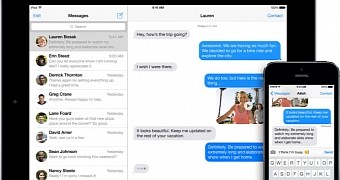At the moment, iMessage is deeply baked into iOS, so only those with an iPhone or iPad can chat with each other, but it turns out that Apple might be having a plan to make it widely available to those who aren’t part of its ecosystem.
There’s a new report out there claiming that Apple might be bringing iMessage on Android devices, and an announcement in this regard could be made as soon as WWDC, which kicks off next week.
Although details are very scarce right now, MacDailyNews claims that bringing iMessage on Android is part of Apple’s efforts to invest more in services, a strategy that most tech companies seem to embrace these days, including rival Microsoft.
But bringing iMessage on Android could actually be a double-edged sword for Apple, as it could indeed pay off and attract more users to its services, but it might at the same time do more harm than good.
First and foremost, by opening the iMessage service to Android users, Apple can appeal to many more smartphone owners - market share stats show that Android is the leading platform around the world with a share that’s getting close to 80 percent, whereas iOS is the runner-up with approximately 15 percent. So iMessage on Android could indeed create new opportunities for Apple, as the service would become available on the world’s two biggest smartphone operating systems.
Apple needs to play its card right
But on the other hand, releasing iMessage on Android could give users another reason to refuse to buy an iPhone. Although there’s no data in this regard available, there are iPhone buyers who had to purchase the handset because everyone in their circles was using iMessage. So if iMessage lands on Android, this reason would pretty much fade away, and an Android device would be just as good as an iPhone for communication purposes.
At the same time, by opening iMessage to more users, Apple is also stepping into a world that’s currently dominated by WhatsApp. Competition in the mobile messaging world is fierce, and WhatsApp and Telegram are the leading choices, with both of them investing hard in security. Both are offering end-to-end encryption, just like iMessage, but Apple guarantees that conversations will always remain private, and the recent San Bernardino iPhone case is living proof in this regard.
The most recent statistics have shown that WhatsApp had 1 billion monthly active users in February 2016, an increase of 300 million from the 700 million recorded in January 2015.
Without a doubt, Apple needs to play its card right here because if iMessage lands on Android, it could have the same faith as BBM. BlackBerry’s messaging solution, which offered state-of-the-art security, suffered from poor adoption figures, mostly because of the lack of features, such as video call support, which remained exclusive on BlackBerry devices, but also due to the mandatory account that required users to register and then manually add all their accounts.
WhatsApp, on the other hand, offers contacts integration, and with the right permissions, it automatically adds users who have already installed the app in your favorites list.

 14 DAY TRIAL //
14 DAY TRIAL //